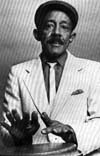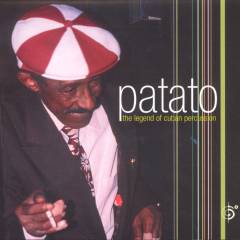
Bio ~ Recordings ~ Grammys ~
Photos ~
Articles ~
Links ~ Home
| For over 50 years, Carlos "Patato" Valdez had demonstrated how a musician can combine technical skill with superb showmanship. His conga playing fused melody and rhythm, and his understanding of rhythm was rooted in dancing. Patato dazzled onlookers with his famed dance moves at the age of 74 -- he's the man who gave Brigitte Bardot a mambo lesson in the film And God Created Woman- -- dancing to his own solo in front of the congas, behind them and on top of them, bringing them to sing in voices no other conga player is able to create, luring them to tell tales full of melodies and poignancy. It is Patato's spontaneity and charm that enabled him to draw audiences from vastly different backgrounds and cultures into the irresistable Afro-Cuban rhythms which he created. |  |
 |
Patato
came to the United States in 1952 and worked at New York's Tropicana
nightclub with Conjunto Casino. In 1954, he said good-bye to his homeland,
Cuba and never returned. Patato's first jazz work was with Billy Taylor
at Philadelphia's Blue Note jazz club. After that he worked at New
York City's Apollo Theater with trumpet player Chip Murray and played
on his first jazz recording, Afrodesia, with trumpet player Kenny
Durham. Years later Patato formed a group of his own, which he named
Afrojazzia. Although Patato had recorded few albums as a bandleader, he was more influential than almost any other conguero because he invented the tunable conga, a revolutionary step in music history. Before Patato's innovation, the traditional conga consisted of a wooden body with a nailed-on drum skin, which was tuned by holding a candle beneath the skin, but the results of this technique were not very satisfactory, as the tension of the drum skin slackened as soon as the skin cooled down again. It was Patato's idea to fix the skin to a metal ring which, connected at various points with the conga body, could be stretched and loosened with the help of a square box wrench, thus enabling the musician to tune his instrument to specific pitches. Consequently, it was now possible to hit each half step of an octave, initiated by Patato's unique melodic style of employing multiple conga drums and using them as a melody-creating instrument, just as a piano player or a horn player would. |
| Patato
patented this invention, and the company Latin Percussion Inc. began
manufactured the instrument. Latin Percussion's "Patato Model" is
the top star of their product family, and Patato's conga type is now
used by hundreds of groups from Santana to the Rolling Stones, as
well as by a lot of well-known congueros, many of whom are his former
students. Since the 1950's, Patato had been among the congueros who were in highest demand in the Latin music and jazz worlds. He played, toured, and recorded with Miguelito Valdes, Perez Prado, Beny More, Cachao, Tito Puente (who called him "the greatest conguero"), Machito, Herbie Mann, Kenny Dorham, Art Blakey, Elvin Jones, Dizzy Gillespie and Quincy Jones. Patato also acted in and composed the title song for the television series The Bill Cosby Show. In 1991 he contributed to the movie soundtrack of The Mambo Kings Play Songs of Love. Patato, along with The Machito Orchestra, Candido Camero, Armando Peraza, Alfredo "Chocolate" Armenteros and Francisco Aguabella, was chosen by the Smithsonian to participate, in the Mambo and Afro-Cuban Jazz seminar hosted by Musica de las Americas. This series was an unprecedented event that celebrated the long tradition of exchange among the diverse music cultures of the Americas. |
 |
Biography Courtesy of Chesky
Records © 2004 Chesky Records. All rights reserved.
Copyright 1998-2020 P. M. Records